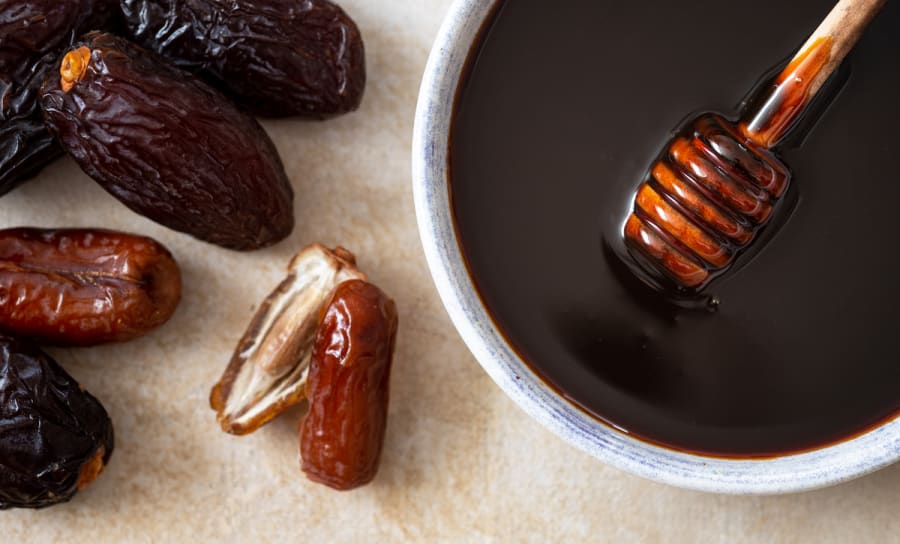Date honey in Israel - An example of how God can and does renew all things

There are several traditions connected to the first Fall Feast of Israel, Yom Teruah, (Feast of Trumpets), commonly known as Rosh Hashanah (New Year).
In the bible, it’s a holy convocation and appointed time for God to meet with His people. It’s a time for spiritual awakening, reflection, teshuva (repentance) and seeking God’s blessing. The long-held custom of dipping apples in honey is symbolic of our prayer for a good and sweet new year.
Devash, the Hebrew word for “honey” is mentioned at least 55 times in the Bible and refers to the syrup from grapes and fruit trees, as well as honey from the bee. In the majority of those instances, honey is used metaphorically or symbolically to represent wisdom, healing, the sweetness of God’s word and the promises of abundance.
“How sweet are Your words to my taste, sweeter than honey to my mouth!” (Psalm 119:103)
Most biblical scholars agree that the word for honey in the infamous verse found in Exodus 33 specifically refers to the syrup of fruit trees. Syrup from the date palm was very common in biblical times and was used to sweeten food and wine.
Commonly known in Israel today as silan, this “date honey” made its way back into Israeli culture in the 1990s with Iraqi Jews and sits on shelves in most Israeli kitchens.
Silan has become increasingly popular in the United States over the past few years, with home and professional cooks alike. Similar in texture and color to molasses, and lower in calories and sugar than honey, it’s quickly become a favorite for foodies. Silan can be mixed with tahini to make a sweet spread, used in marinades and vinaigrettes, and drizzled on oatmeal, yogurt or ice cream.
Date palms all but disappeared from Israel after the destruction of the temple, when Rome sought to destroy one of Israel’s strongest commodities at the time. By 500 A.D., the date palm was almost completely wiped out from the region.
In the early 1900s, when Jewish settlers came to the land, date palms were sparse in contrast to biblical times when they abundantly covered the Jordan River Valley between Jericho and the Dead Sea. Several thousand date palm saplings were smuggled into the land from Iraq by Ben Zion Israeli, a Ukrainian immigrant who made aliyah (immigrated to Israel) in the early 1900s. Those trees were cultivated and produced the Medjool date, commonly found in Western grocery stores today. There are other varieties, like the smooth Deglet Noor, Golden Zahidi (also called the butter date) and the crunchy Barhi dates that can be found in the markets around Rosh Hashanah.
The ancient Judean date palm, once revered in antiquity for its vast medicinal qualities, has an incredible story of revival matched only by the revival story of modern Israel itself.
Over 2,000 years ago, at the edge of the Judean desert, thousands of feet above the Dead Sea on a rocky plateau, when the last group of Jewish rebels held out against the final Roman siege, a small clay jar filled with date seeds was buried under the rubble that was left there.
In the 1960s, while excavating Masada, a Jewish archaeologist discovered the jar of seeds dried out by two thousand years of desert surroundings and they were stowed away in a drawer at Israel's Bar Ilan University for about 40 years.
In 2005, Dr. Elaine Solowey obtained the seeds that existed from the time of Jesus and, contrary to what was considered botanically impossible, successfully germinated one. The seed sprouted into a young date palm, resurrecting what was thought to be dead for nearly two millennia.
The date palm was appropriately named “Methuselah.” Methuselah represents a variety of date palms in ancient Judea that were considered a delicacy and thought to have medicinal properties absent in today’s date palm varieties. Seven additional kinds of ancient Judean date palm trees have been resurrected from the seeds found at three other archaeological sites, including Qumran, and now grow in the southern region of Ketura.
In August 2021, The Arava Institute for Environmental Studies in Israel harvested three bunches of dates from the successful breeding of the trees that were wiped out thousands of years ago when the Jewish people were driven from their land.
As we dip our apples into honey or silan, and reflect on the sweetness of God’s blessings, we can also be encouraged by the miraculous ways our God continues to make all things new!
-(1).jpg)
Avigayil Rivkah is a writer and speaker on the Jewish roots of the Christian faith, Jewish culture and Israel news. She is a Jewish believer in Jesus and writes at ajoyfuljewishjourney.com














